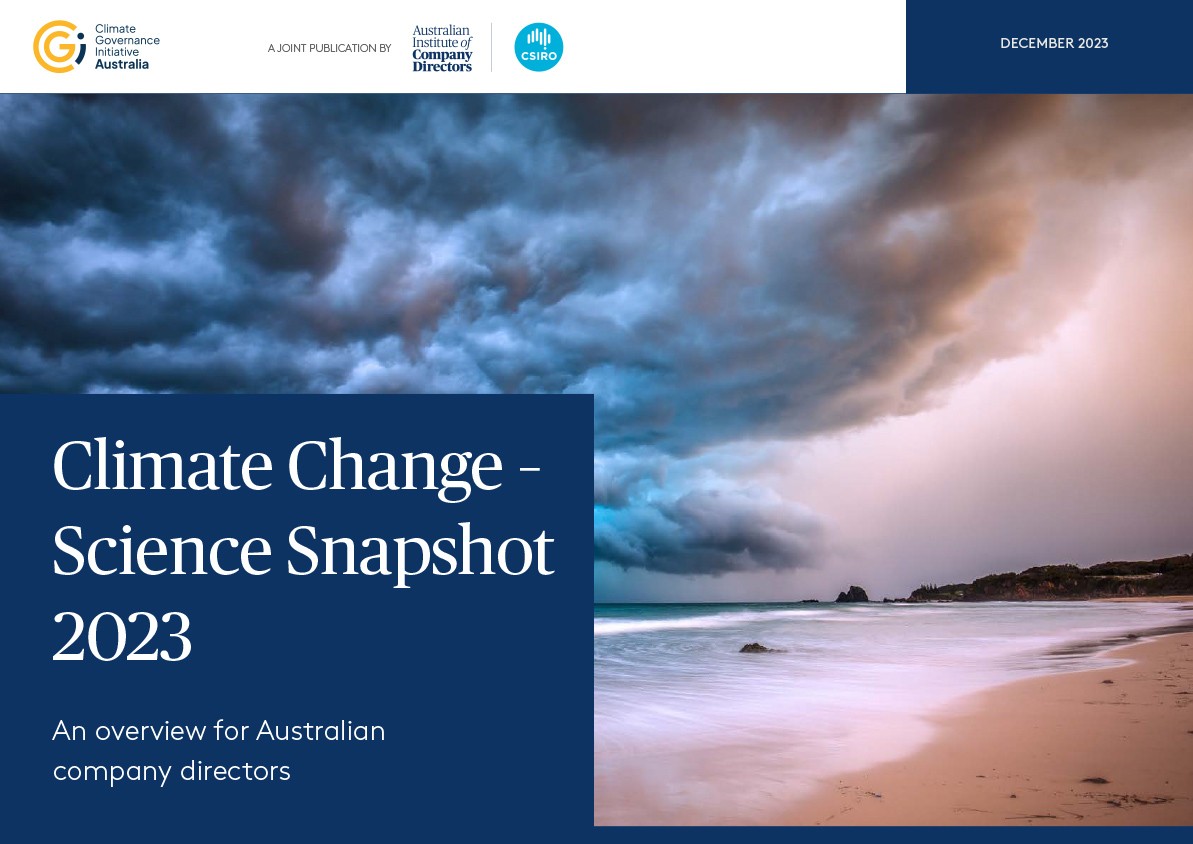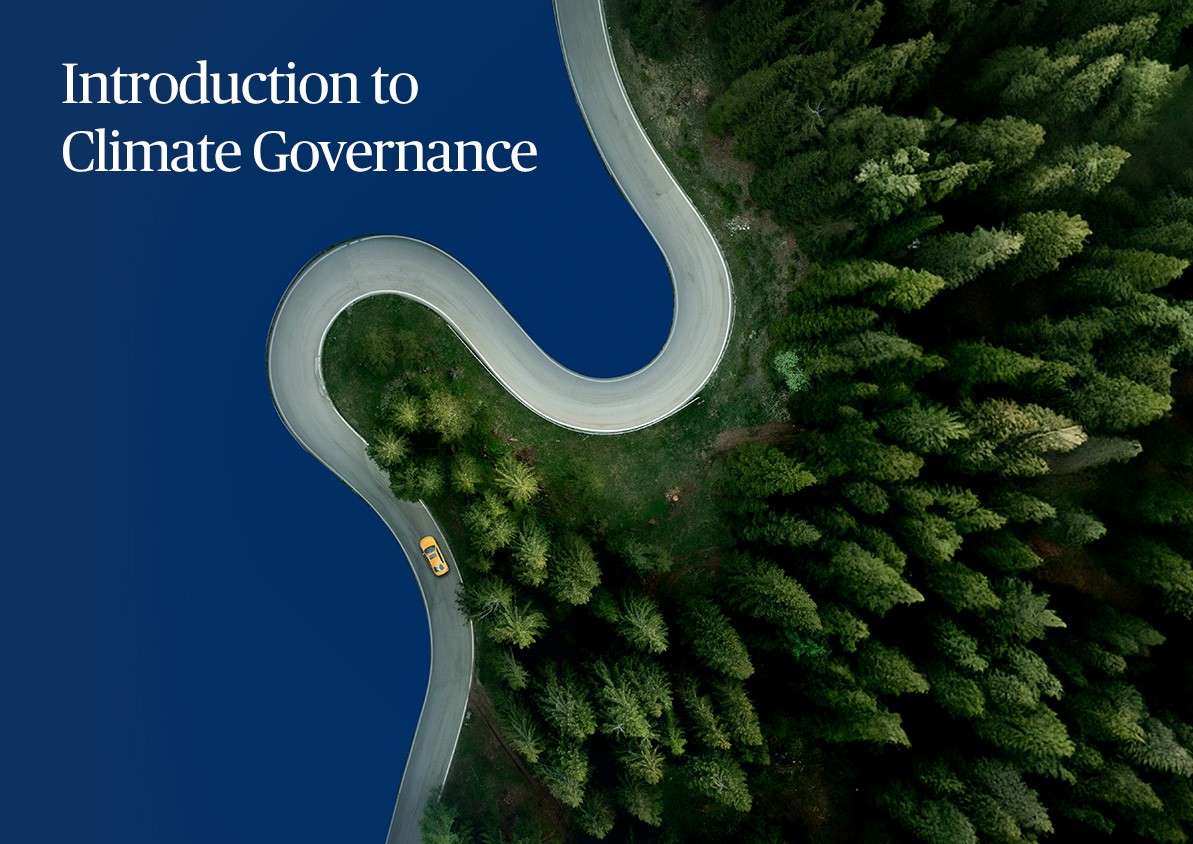The COP28 climate summit ended this week with a hard-fought deal to transition away from fossil fuel use in energy systems. The agreement brokered by hosts the United Arab Emirates is deemed ‘historic’ but still falls short of achieving the course correction required to put the Paris Agreement on track.
To help directors navigate evolving expectations, the AICD is pleased to introduce two new resources tailored for directors: the Climate Change – Science Snapshot, prepared in partnership with CSIRO; and the Introduction to Climate Governance e-learning module.
Also in this newsletter:
- As COP28 comes to a close – what was achieved? And what comes next?
- Australian government climate change statement
- Wrap of local climate developments including the creation of the Nature Finance Council.
Climate change science snapshot for boards
Stay across the latest scientific insights relevant to board decisions with our snapshot, prepared with Australia’s leading science body, the CSIRO. The Climate Change Science Snapshot 2023 offers directors accessible information on the current state and future outlook of climate change globally and in Australia, suggesting key questions for boards. The resource highlights that the globe remains on a 2.5 to 3°C warming trajectory by the end of the century. It includes a concise table outlining climate-related risks under various warming scenarios. This resource is updated to align with the latest science as at December 2023.
New: Introduction to Climate Governance e-learning module
Gain essential knowledge with AICD's self-paced e-learning module on climate governance for directors. Pitched at an introductory level, the module covers climate fundamentals, risks, directors’ duties, regulations, and implementation planning. Insights from experts and practicing directors are presented in a flexible, accessible online format. The module will take approximately two hours to complete and is free for AICD members. It is also available for a small fee for non-members. Learn more.
COP28: World takes an important step forward, but remains off-course for Paris goals
The two-week COP28 summit in Dubai was extended to secure agreement on a ‘transition away from fossil fuels’ – the first time the world has united around a concerted move away from coal, oil and gas use in energy systems. Even with this important step forward, key analysts and climate scientists say pledges made at COP28 will not be ‘nearly enough’ to move the world onto a path to achieve the Paris Agreement goal of limiting global warming to 1.5°C.
The summit commenced strongly with a breakthrough agreement to formally establish a Loss and Damage fund aimed at aiding nations susceptible to the effects of climate change. This mechanism recognises that countries most likely to be impacted by climate-related consequences bear the least responsibility for the issue. While wealthy nations have committed slightly over US$700 million, questions persist regarding the requisite size of the fund, its priorities, its relationship with other funds, and its long-term administration.
Finance constitutes one of the three fundamental pillars of the Paris Agreement – the others being climate mitigation and adaptation. There was convergence on a 1.5°C-aligned energy transition, but no consensus on the adoption of a robust framework to support the global goal on adaptation. The absence of comprehensive information on adaptation needs, opportunities, and costs impeded progress. The adaptation funding gap is estimated to be almost four times the annual US$100 billion promised for climate finance.
Azerbaijan is set to host the next summit in 2024, and Brazil is expected to host in 2025. Australia, in collaboration with the Pacific, has offered to host COP31 in 2026 – that decision remains pending.
For a detailed, director-relevant briefing of COP28, register for the COP28 directors wrap-up event being run by the CGI international network.
Climate change statement: Australia expects to fall just short of 2030 emissions target
The Australian government's annual climate statement disclosed that increasing renewable energy generation, alongside the Safeguard Mechanism, will be the significant contributors to emissions reduction until 2030. An expanded Capacity Investment Scheme aims to provide the nation with 'reliable, affordable, renewable energy.'
However, Australia’s Emissions Projections 2023 report, which was released together with the climate statement, projects that Australia, under its current polices, is on track to achieve an emissions reduction of 42% relative to 2005 emissions, just shy of the 43% legislated target.
In his official address preceding Australia's representation at COP28 in Dubai, Minister for Climate Change and Energy, Chris Bowen, stressed the urgency, stating, 'We are being swept along towards dangerous degrees of warming, and we must urgently course correct.' At the conclusion of the summit, Minister Bowen said: ‘our future is in clean energy and the age of fossil fuels will end.’
Other climate-related developments in Australia
- NSW climate change bill passes: The NSW Parliament passed the Climate Change (Net Zero Future) Bill 2023 which legislates NSW’s 2030 emissions reduction target (a 50% reduction on the 2005 level) and its 2050 net zero target.
- New Nature Finance Council: The Australian Government announced the establishment of a Nature Finance Council. This advisory body, which includes senior non-executive directors David Thodey and Ian Hamm among its 13 members, will provide a platform for private sector collaboration on nature repair, among other priorities.
- Making environmental claims: A guide for business was published in final form by the ACCC in December, having consulted on the draft version (the AICD made a submission). It sets out eight principles to support trustworthy environmental claims, with the stated aim to decrease instances of greenwashing and support businesses to comply with Australian Consumer Law.
- CSIRO issues new report detailing decarbonisation pathways for Australia: CSIRO has applied International Energy Agency (IEA) modelling to deliver an Australia-specific decarbonisation pathway. The report details low-emissions paths for major economic sectors and finds existing technologies can help deliver 52% emissions reduction cuts from 2020 levels by 2030.
- Net zero in government operations strategy: This strategy describes the approach for implementing the Australian Government’s commitment to achieve net zero government operations by 2030, as included in Australia’s Nationally Determined Contribution Communication 2022 under the Paris Agreement.
- Sectoral net zero transition plan consultations: The Australian government is progressively consulting on its economy-wide Net Zero Plan. Following consultations on the Agriculture and Land sectoral plan, it is now inviting feedback on the Transport and Infrastructure net zero roadmap and action plan.
Significant new climate resources
|
Governance
|
Climate in Focus back in January 2024
2024 is expected to be a landmark one for climate governance and reporting in Australia. We look forward to supporting you as directors and welcome any feedback on the value of our resources. Best wishes for Christmas and the summer break – we will be back in touch in the New Year.
Already a member?
Login to view this content




